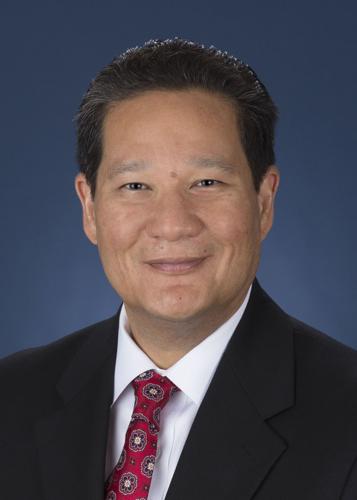Pima Community College Chancellor Lee Lambert will continue to lead the college until 2026.
Despite strong dissent, the PCC Governing Board voted 3-2 on Wednesday night to extend Lambert’s most recent contract by one year and increase his annual base salary by 2%. That takes him from $342,093 — which the board approved in his five-year contract, which was supposed to run from 2020-25, last year — to $348,935.

Pima Community College Chancellor Lee Lambert.
Under the terms of the extended contract, Lambert will also receive a one-time $1,000 payment for fiscal year 2022, a $2,000 monthly car allowance, $1,150 a month for business expenses and a $60,000 tax-sheltered annuity allowance.
Lambert was a finalist for the top job at both San Diego Community College District and Evergreen State College earlier this year, but neither one panned out.
Before Lambert took the helm at PCC seven years ago, he had served as president and CEO of Shoreline Community College since 2006. In 2013, when Lambert signed his initial three-year contract with a base annual salary of $290,000, PCC was mired in scandal.
One year before Lambert took the job here, former Chancellor Ray Flores had resigned after eight women accused him of sexual harassment throughout his tenure. Then, a matter of months before Lambert arrived in Tucson, the Higher Learning Commission, which accredits PCC, put the college on probation. In addition to problems tracking enrollment, mismanagement and lax governance, the commission noted “a culture of fear and retribution that pervaded the administration.”
Lambert led PCC through its accreditation woes and all sanctions were lifted in 2017. By that point, all of the board members who had served during the “dysfunctional” Flores days had been replaced. In 2019, an update from a team of accreditors who had made a recent visit to campus said the college improved on student assessments, planning, budgeting processes and redesigning developmental education.
Accreditor to visit
But the commission now has a focused visit planned for no later than April 2022. It comes in response to a complaint Bill Ward, a former facilities administrator, filed with the commission earlier this year. It alleges PCC engaged in unlawful contracting practices with Trane, an HVAC company, regarding an energy management project at the college.
“There is no information in the complaint that supports the allegations or that has not already been reviewed and addressed,” Lambert told the board over the summer, according to an email obtained by the Arizona Daily Star. “While it is unfortunate that we have to devote our time to addressing allegations that have been refuted multiple times, we welcome the opportunity to fully address the complaint with HLC and receive further confirmation that Pima College has fully complied with accreditation standards.”
After reviewing Lambert’s explanations, the commission alerted the college last month that it will schedule a campus visit to assess whether or not “the governing board of the institution is autonomous to make decisions in the best interest of the institution in compliance with board policies and to ensure the institution’s integrity.”
That visit is one of the reasons why board member Maria Garcia voted against the contract extension.
Garcia also cited “a negative culture that does not support the principles of shared governance, does not encourage dialogue and does not respect dissent” as well as the “the use of questionable and arbitrary procurement procedures,” and the termination of a whistleblower, referring to Ward.
“In my judgment, the chancellor and certain members of the board have established a symbiotic relationship, which prevents the board from acting independently and from taking appropriate steps to safeguard the college and its employees,” Garcia said. “I regret to inform the faculty and staff that safeguarding the rights of employees is not a priority at PCC.”
Catherine Ripley, who voted in favor of the contract extension alongside Meredith Hay and Chair Demion Clinco, countered some of Garcia’s assertions.
“The term symbiotic relationship is a strong term and I would disagree with that,” Ripley said. “Our relationship with the chancellor is extremely crucial. Is it symbiotic? It’s only symbiotic in as much as we all agree that the betterment and the success of the school is the foremost and first priority of our students, staff, faculty and administration.”
Extending administrator contracts has been routine practice at PCC for years. So, Ripley, who characterized Lambert’s achievements during his tenure at PCC as “astounding,” said not extending his contract by one year would be a form of punishment.
“You do not punish someone midstream who’s been doing an outstanding job,” Ripley said. “On the contrary, if anything we should be rewarding this chancellor for not only getting us through COVID with flying colors, but taking the college to the next level.”
Since 2019, Lambert has turned his focus on growing the college’s workforce development offerings through the “Centers of Excellence. It’s a $65 million initiative that involves renovating and expanding facilities to provide hands-on training through partnerships with local businesses for students interested in automotive repair, hospitality and cybersecurity and other in-demand careers.
The college is also working toward meeting two ambitious goals outlined in the multiyear strategic plan: By the 2024-25 school year, it wants to increase the number of students who complete their programs by 65% and double the completion rates of Hispanic or Latino, American Indian and Alaska Native and Black students.
In the short-term, Lambert’s goals for this school year, which the board approved in September, are focused on expanding access and affordability, growing and diversifying the student body, and identifying gaps in student needs, among other initiatives.
Enrollment plunge
Lambert has faced navigating the COVID-19 pandemic and dramatic enrollment declines at PCC. Across the country, the economic uncertainties of the pandemic have hit two-year colleges especially hard, and PCC hasn’t escaped. Its total student population has fallen by nearly 20% since fall 2019 and about 25% over the past five years.
According to financial reports from the Arizona Auditor General’s office, between 2013 and 2020, full-time student enrollment at PCC decreased from 19,515 students to 13,874.
“I think it’s time that the faculty, staff and our community consider the ongoing crisis at this institution, and that crisis is the steady decline in enrollment since the chancellor assumed his post,” board member Luis L. Gonzales said before voting against Lambert’s contract extension.
While Gonzales acknowledged that outside factors beyond the college’s control could explain some of its enrollment problems, “It is beyond dispute that this continuous decline in enrollment has occurred on the chancellor’s watch.” In his view, “A leader cannot claim to be responsible for the college’s success while shunning responsibility for declining enrollment.”
Gonzales also called for a “no” vote on the contract extension until the college increases the compensation for faculty and staff and publicizes the board’s most recent evaluation of the chancellor’s performance.
“If the taxpayers of Pima County knew the score he received, there’d be little support for this contract extension,” Gonzales said. “All of us have heard the chancellor and the board profess their commitment to transparency. Yet, the community through the elected members of the board are asked to extend the chancellor’s contract without full disclosure of the board’s evaluation. This is unconscionable in a public, post-secondary institution.”
Clinco got the last word when he came to Lambert’s defense right before casting the tie-breaking vote in favor of the contract extension.
“You have continued in the face of outrageous and continual accusations of wrongdoing and illegal behavior,” Clinco said directly to Lambert. “In the face of unbelievable poor treatment by members of this board, you have continued to act with incredible integrity and aplomb.”






